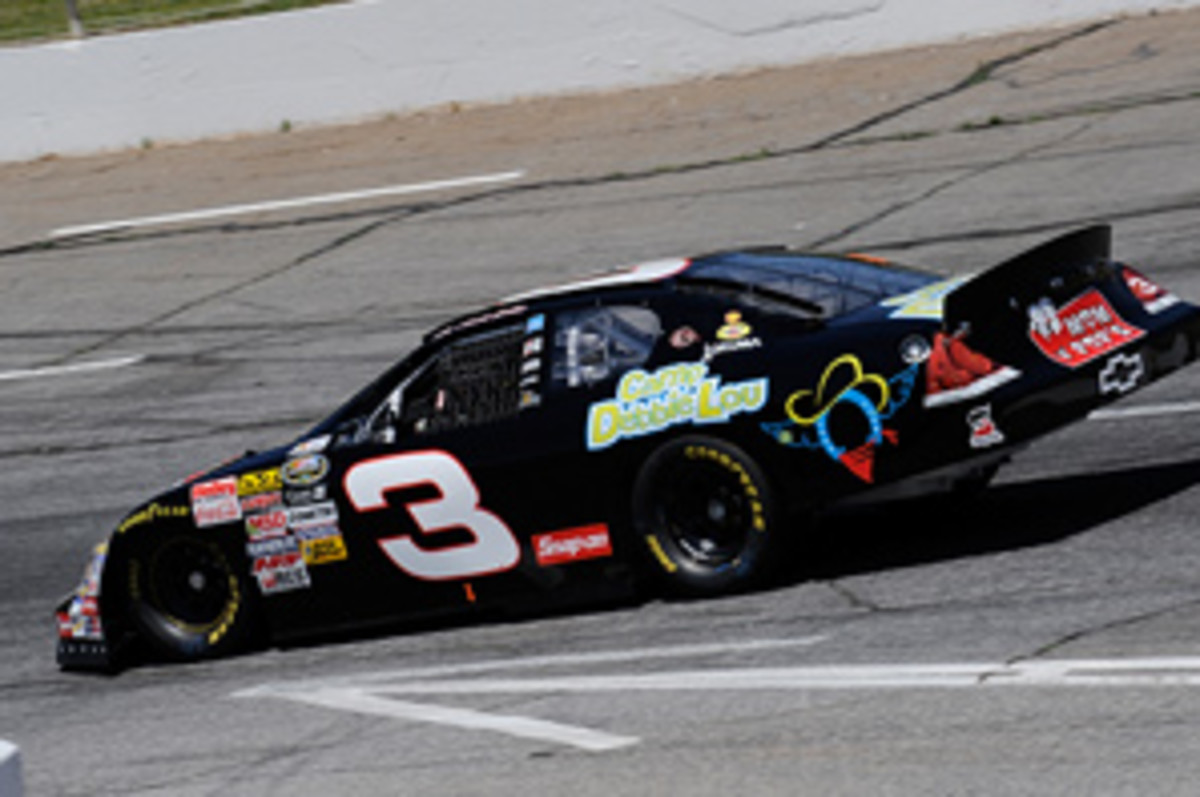Austin Dillon and the power of 3; Johnson in the camera's eye
Austin Dillon understands the mystique. He did, after all, grow up around it as the grandson of Richard Childress, who won six Cup championships with Dale Earnhardt, Sr. in that still-iconic black No. 3 car.
Dillon claims he understands the pressure. And in fairness, each step of the 19-year-old's progression from racing hobbyist to professional has been inevitably tempered by claims of nepotism. But driving the No. 3 in the minors twice is a different matter than the full trucks season he's about to undertake. The number -- which has 97 wins at NASCAR's highest level, third-best all-time -- has been entered in a NASCAR top-three event just four times since Earnhardt was killed on Feb. 18, 2001 during the last lap of the Daytona 500. It was used twice by Dale Earnhardt Jr. in the Nationwide Series in 2002 (once in victory at Daytona) and Dillon employed a black model truck twice in 2009.
Now it's his. But then again, it's not. The scrutiny? Yes, that's all his.
"There's always going to be people taking about it," admitted the 2008 NASCAR Camping World East Series Rookie of the Year. "I like the pressure of racing it. There's just more to it, I guess."
Even Dillon's grandfather hedges about whether Dillon would use the number if he ever advanced to the Sprint Cup series. Nationwide, perhaps. Childress, who yearly leases the use of the number from NASCAR, said he's inclined to save that digit for "if an Earnhardt comes along some day, a grandson or a great grandson or whatever."
Childress said there are no plans to use the number 3 in the Sprint Cup series, and had to break it to his grandsons Austin and Ty very early on that a number they so associated with their family was being saved for a member of a different family. Childress also raced the 3, but never won with it in the Cup series.
"When they started racing Bandoleros, I asked, 'Well what number do you want?" Childress recalled. "Austin says, 'I want your number.' I said, 'Well, that was number 3, you know that was Dale's number.' He understands that. He understands the pride that goes behind it and he understands that Dale made it famous and we're all still honored to have it in the family.'
Jimmie Johnson had no advance screening of the new four-part HBO show that documents his preparation for the Daytona 500, and that made for a pit-in-the-stomach moment as he awaited the premier last night. Here's our chat with the four-time defending Cup champion:
SI.com: No advance screening, that has to be nerve-wracking, right?
Johnson: Yeah, and really no editing rights. If there' s something they're shooting that I don't like, I can certainly say no, but once they have it, they take it. It's kind of an on-the-spot thing. If I think about it and I say I don't want it, I've got that ability, but essentially once they seal the package and FedEx that little package off, it's done. It's in the hands of the editors.
SI.com: How many people do you have stomping around your house?
Johnson: It seems to be growing. There's a core crew that's been with us There's three producers. The first two were down and kind of laying out the agenda for the four episodes. A third field producer came in and is now with us the rest of the way while the other two are still at home making sure stuff is falling into place as hoped. Before they started with me full time, they'd been here weeks if not a month collecting stuff from (owner) Rick (Hendrick) , (crew chief) Chad (Knaus), crew guys, the 500 car itself. They're mapping out where things go. A skeleton crew is a sound man, a camera guy, and another dude lugging the cables. So the smallest crew is four and somebody from our side for that small editing opportunity. Anywhere I go, I have a crew of five.
SI.com: How do you keep from acting for the camera?
Johnson: It's tough. First, everything had been mapped out: we need to collect this and this. Then it started where it's just roaming cameras, so we are now adapting to that and getting used to it. The part that probably makes it easier is it is not a reality show. They're not camped out in our house waiting for every moment. We're doing a documentary on what it takes to get ready for the Daytona 500, so I have a huge break in time on some things.
SI.com: Is there a concern over letting too much of your privacy lapse?
Johnson: No, not shooting the documentary. I would not be interested in this if it was a reality show. I have no desire to open my life up and have my relationship with my wife and my personal stuff exploited. A good friend of mine, Nick Lachey, has lived through that and he would show up at my doorstep and kick my ass if I did that.
SI.com: Is it nice to have a celebrity privacy consultant you don't have to pay?
Johnson: I've never seen anyone with so much attention from paparazzi and things like that. A lot of my great friends are very successful, from musicians to actors and actresses. The buzz since [Lachey] opened his life up and so many people found it interesting, it's amazing, and it's uncomfortable. I feel terrible for him. Any time he goes out to have a casual lunch or dinner and he leaves that restaurant, there are 20 cameras outside. It is mind-boggling. His world has changed. His privacy, things like that, but he is a great man. He has a good heart. Good friend. And he has been persistent about, "Do not do a reality TV show."






